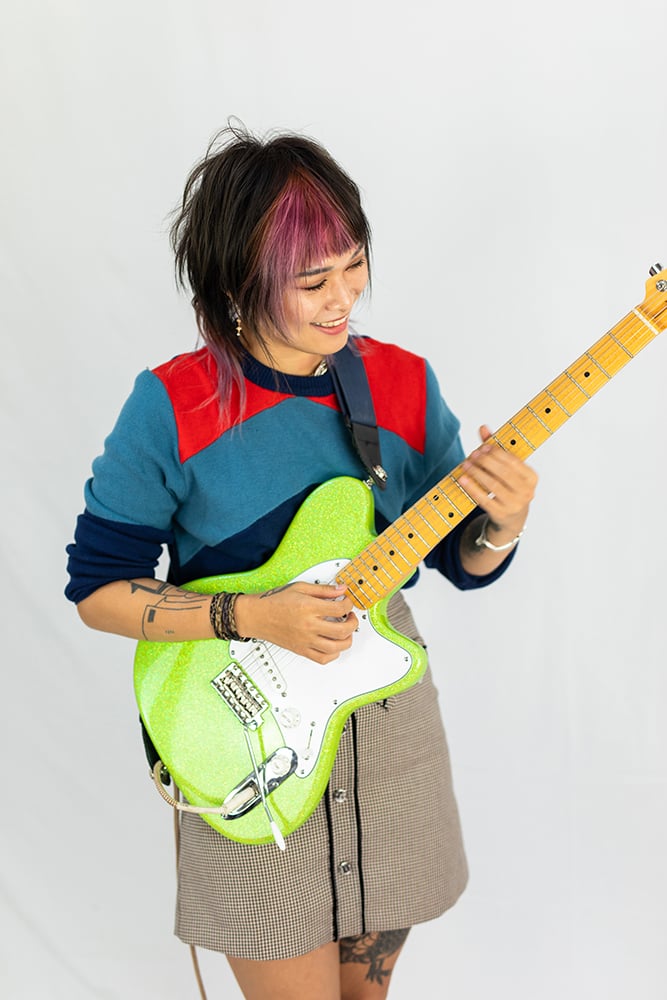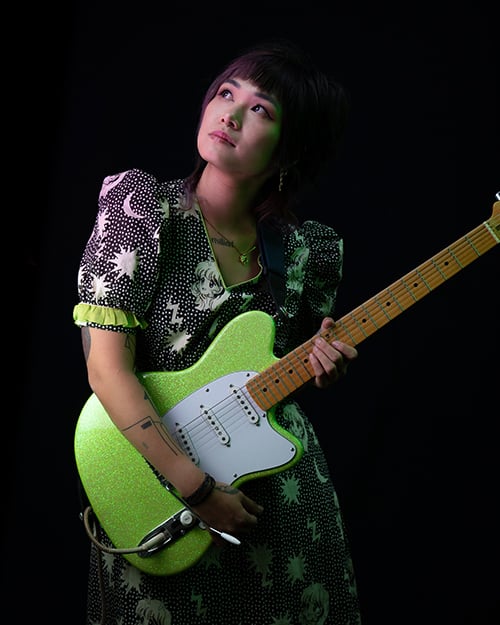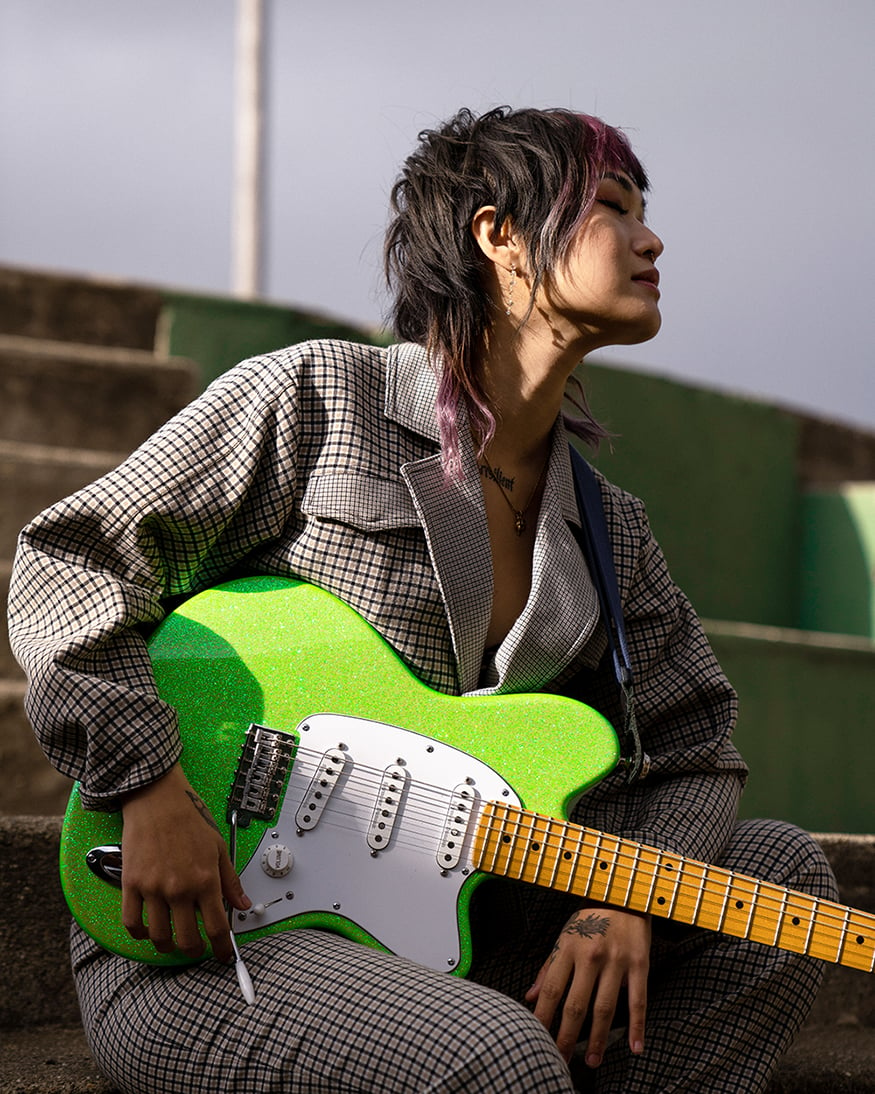Yvette Young is a rising star in the guitar world, but it’s her roots in piano that inform her songwriting.
The 29-year-old Californian is known for her signature two-hand tapping technique. As the founder of math rock band Covet, Yvette leads the trio through dense, polyphonic melodies and swirling, irregular time signatures.
Yvette joined Lisa for Episode #13 of the Pianote podcast for a warming discussion on music, mental health, and how the piano has informed Yvette’s songwriting. This is a convo you don’t want to miss!
We’re giving away a 30-day Pianote trial for all you Yvette fans who want to learn piano as a second (or first!) language. Cancel anytime.
Yvette started learning piano when she was only four years old. She grew up in a family that takes music very seriously; in fact, one of her cousins is a university piano professor.
But for Yvette, learning piano was an obligation, not a pasttime. As a child, she dreaded her piano lessons. She wanted to play basketball, be a firefighter, or become a paleontologist — anything but play piano.
Yet her parents expected her to practice four hours a day. “I would hide under the piano and, like, hold the feet, and my dad would have to pull me out,” she says. In middle school, she’d come up with creative ways to fake that she’d been practicing.
The pressure to excel at music, among other things, would seriously harm Yvette’s mental health. Yet despite this rocky start, Yvette has become an accomplished musician. The piano informs her songwriting style, and she’s even released an EP dedicated to the instrument.

💡⁉️ What the heck is math rock?! Math rock is a subgenre of rock music. It often includes dense polyphony (multiple voices), uncommon structures, unusual tunings, and irregular time signatures (like 9/8). Often performed without lyrics, it can be challenging to listen to at first but is admired by fans for its complexity.

In high school, Yvette’s daily schedule was stuffed to the brim. She was in two orchestras, participated in piano competitions, and chased straight-As at school.
A self-described perfectionist, the stress from everything was so intense that, at 16, Yvette developed anorexia. Her heart stopped working properly and she was eventually hospitalized.
It was during her hospital stay that Yvette fell in love with the guitar and songwriting. Music — once a source of negativity — became an oasis.
Yvette recalls that she never liked playing other people’s music in orchestra. She would much rather create her own — and she did. As her songwriting skills grew, her views on self-worth also changed.
It was through teaching myself guitar that . . . my self-worth became more focused on what I could create with my hands and what I could think up with my mind, rather than how much I weighed.
Yvette calls piano a “superior songwriting instrument” because it allows you to visualize polyphony. (Side note: polyphony is when multiple voices or melodic lines happen at once.) Indeed, there are few easier instruments to play melody, harmony, or more at the same time.
The technique Yvette uses to play guitar, called finger-tapping, is also informed by her piano background. She rarely uses a pick. “If you want to take away my superpowers,” she says, “just tell me I have to use [a pick]!”
🎸 Finger-tapping — popularized by rockstars like Eddie Van Halen and Steve Vai — is when guitarists strike strings directly on the fretboard (like a piano!). While resonance is more challenging, this technique allows for very quick and complex melodies.
Yvette also prefers dynamic pickups on her guitar. This gives her the touch sensitivity needed to play tone qualities in a similar way to piano.
Yvette approaches songwriting like storytelling.
For example, she might imagine herself writing the theme song for a sinister king. Or music that accompanies two kids running away from home and into a forest. She calls this “adventure rock.”
Another thing that informs Yvette’s composition is visual art.
Yvette’s first love was actually in fine art. It was also her concentration in university.
And she likens her songwriting process to making art. First, she sketches out a song using a basic dry tone on her guitar. Then, she “colors in” the sketch by experimenting with different tones and sound effects.
🎹❓ IS piano the best songwriting instrument? Try it yourself. We’re offering Yvette fans like you a 30-day free trial of Pianote membership. This includes access to course packs like Riffs and Fills and 500 Songs in 5 Days that will help jumpstart your songwriting journey.
When it comes to music notation, Yvette admits to not being the best sight reader. In orchestra, she would use her ear to copy what other people were playing. She still relies on her ear today and encourages other musicians to do the same.
I always tell people, if you don’t know where to go with a song, drop the instrument and sing the melody . . . Everyone plays an instrument — it’s your voice.
As someone who is self-taught, Yvette is prefer playing and communicating through her “own little lexicon.” Which goes to show you don’t have to be an amazing sight-reader to achieve high in music.
As for classical music, Yvette says that with time and maturity, she’s grown to appreciate it. She admires Bach, loves the Romantics, and names film score and minimalist music as favorites.
In 2019, Yvette released an EP simply titled piano. It contains five tracks for piano with rock-like accompaniment. The sound is similar to math rock, albeit with more pianistic dynamics.
I composed and recorded these pieces over a year with the intention of telling a story. Each song is about a person, experience, or a place that touched me in some way. I hope these songs can take you somewhere.
Yvette Young on Bandcamp

Today, Yvette is lauded for her skills. But she’s also admirably humble and self-aware.
And despite endorsements, achievements, and acclaimed performances: “Imposter syndrome . . . is something that really resonates with me,” says Yvette. “Especially coming from someone who is self-taught, I’ll always feel like I’m not doing something correctly.”
Yvette has a signature guitar with Ibanez. But she was actually offered a signature model earlier and turned it down. Yvette felt she wasn’t ready at the time, so she decided to wait a few more years.
While her songs are speedy, Yvette constantly reminds herself to not “try to walk before I run.” After all, playing slow can reveal sloppy technique. “True mastery occurs when you can play something at both a really slow speed and really fast.”
P.S. If any brands are listening…both Yvette and Lisa would LOVE a signature piano model in pink glitter!
Rhythm is a challenge for many pianists. It requires a good deal of hand independence, and practicing with a metronome can be gruelling.
As someone who works with unconventional time signatures, Yvette has several tips:
If you feel inspired by this interview, so do we! Make sure to catch more episodes of the Pianote podcast on Spotify. If you’re interested in Yvette’s work, check out her YouTube, Instagram, and Bandcamp.
And don’t forget to sign up for your free 30-day Pianote trial! You’ll get access to exclusive video episodes of our podcast with your membership.
Thanks for chatting with us, Yvette!
Charmaine Li is a Vancouver writer who has played piano for over 20 years. She holds an Associate diploma (ARCT) from the Royal Conservatory of Music and loves writing about the ways in which music—and music learning—affects the human experience. Charmaine manages The Note. Learn more about Charmaine here.
/marketing/pianote/lead-gen/getting-started/coach.webp)
/marketing/pianote/lead-gen/getting-started/logo.webp)
By signing up you’ll also receive our ongoing free lessons and special offers. Don’t worry, we value your privacy and you can unsubscribe at any time.
We use cookies for traffic data and advertising. Cookie Policy »